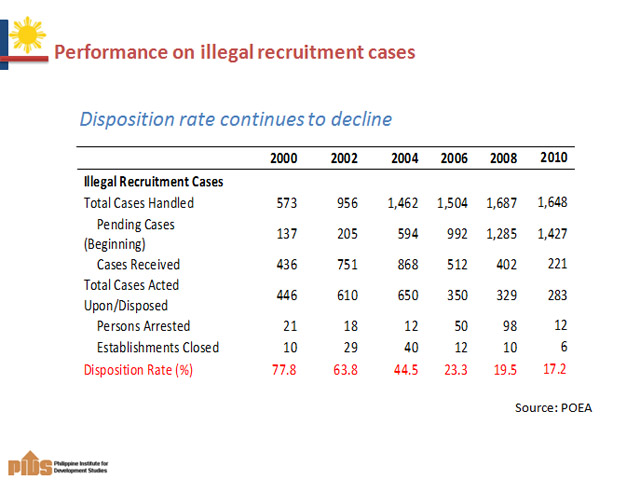Unresolved illegal recruitment cases in PHL piling up, POEA data show
When it comes to resolving cases of illegal recruitment, the Philippines has a low percentage rate --currently at 17 percent — a research organization said on Wednesday. The data was announced by Aniceto Orbeta, Jr. of government research group Philippine Institute for Government Studies during the forum entitled “Migration and Development: Taking Stock of the Situation in Southeast Asian Countries” in Makati City.  According to data culled by Orbeta from the Philippine Overseas Employment Administration (POEA), the number of reported illegal recruitment cases victimizing Filipinos doesn’t seem to be rising, but unresolved cases are piling up. In 2000, there were 573 cases and a 77.8 disposition rate. In 2010, there were 1,648 cases but only 17.2 of those were resolved, Orbeta said. She explained that the 2010 data do not indicate mean that there was a spike in the number of new cases but that the previous cases spilled over each year and piled up. “This may be because of at least two reasons (a) the lack of appropriate number of personnel handling the cases and/or (b) regulations are just too complicated to the bureaucracy to handle,” he explained. Vulnerable to human trafficking Meawnwhile, Brussels-based International Center for Migration Policy and Development (ICMPD) project officer Oleg Chirita said Filipinos are still among the most vulnerable to human traffickers. In an interview during the forum, Chirita said the Philippine government is aware of this threat but illegal recruiters have strong links to organized trafficking syndicates. “No country is immune to trafficking due to the presence of organized transnational syndicates. It’s an Octopus (operation) that recruits people for labor and sexual exploitation,” Chirita noted. Migration data Orbeta, on the other hand, noted the need for a “comprehensive and consolidated migration information system.” He said migration data from agencies such as the POEA, the Department of Foreign Affairs, the Overseas Workers Welfare Association and the National Statistics Office are difficult to cross-reference, therefore affecting the quality of analyses. Meanwhile, Commission on Filipinos Overseas (CFO) Secretary Imelda Nicolas said the government is very much aware of the problems of migrants such as trafficking and that it is doing its best to cope with them, though also admitting the difficulty of such a task. “Number one, we recognize there are problems. Number two, we try to respond to these problems,” Nicolas said. She said the difficulty in trying to solve migration-related problems can be traced to insufficient resources and Filipinos deployed abroad, whose high number makes it difficult for the government to keep track of all of them. For its part, ICMPD and European Union cooperated for project Migration EU expertise (MIEUX). It aims to stop human trafficking in Southeast Asia through fund assistance as well as information and policy sharing. The EU has financed 16 projects worth €13 million related to migration for the Philippines. - VVP, GMA News
According to data culled by Orbeta from the Philippine Overseas Employment Administration (POEA), the number of reported illegal recruitment cases victimizing Filipinos doesn’t seem to be rising, but unresolved cases are piling up. In 2000, there were 573 cases and a 77.8 disposition rate. In 2010, there were 1,648 cases but only 17.2 of those were resolved, Orbeta said. She explained that the 2010 data do not indicate mean that there was a spike in the number of new cases but that the previous cases spilled over each year and piled up. “This may be because of at least two reasons (a) the lack of appropriate number of personnel handling the cases and/or (b) regulations are just too complicated to the bureaucracy to handle,” he explained. Vulnerable to human trafficking Meawnwhile, Brussels-based International Center for Migration Policy and Development (ICMPD) project officer Oleg Chirita said Filipinos are still among the most vulnerable to human traffickers. In an interview during the forum, Chirita said the Philippine government is aware of this threat but illegal recruiters have strong links to organized trafficking syndicates. “No country is immune to trafficking due to the presence of organized transnational syndicates. It’s an Octopus (operation) that recruits people for labor and sexual exploitation,” Chirita noted. Migration data Orbeta, on the other hand, noted the need for a “comprehensive and consolidated migration information system.” He said migration data from agencies such as the POEA, the Department of Foreign Affairs, the Overseas Workers Welfare Association and the National Statistics Office are difficult to cross-reference, therefore affecting the quality of analyses. Meanwhile, Commission on Filipinos Overseas (CFO) Secretary Imelda Nicolas said the government is very much aware of the problems of migrants such as trafficking and that it is doing its best to cope with them, though also admitting the difficulty of such a task. “Number one, we recognize there are problems. Number two, we try to respond to these problems,” Nicolas said. She said the difficulty in trying to solve migration-related problems can be traced to insufficient resources and Filipinos deployed abroad, whose high number makes it difficult for the government to keep track of all of them. For its part, ICMPD and European Union cooperated for project Migration EU expertise (MIEUX). It aims to stop human trafficking in Southeast Asia through fund assistance as well as information and policy sharing. The EU has financed 16 projects worth €13 million related to migration for the Philippines. - VVP, GMA News




